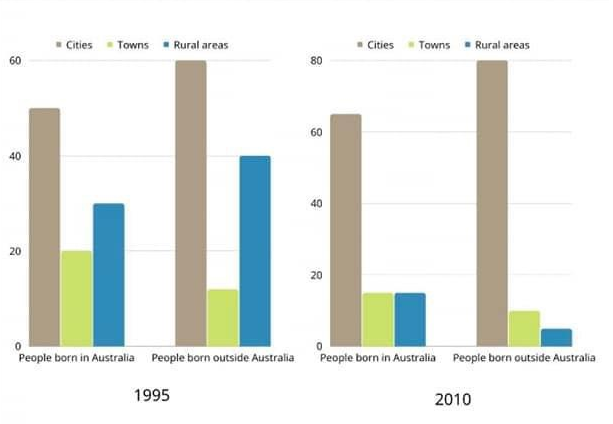[Pramit J] Writing Practice Test 1306004
Task 1
You should spend about 20 minutes on this task.
The bar chart below describes some changes about the percentage of people were born in Australia and who were born outside Australia living in urban, rural and town between 1995 and 2010.
Summarise the information by selecting and reporting the main features and make comparisons where relevant.
You should write at least 150 words.

The bar graph illustrates a few changes in the percentage of people who were born in Australia and who were born in the rest of the world from the year 1995 to 2010.
The graph shows the percentage of three different categories that are cities, towns and rural areas and how it varies from each other and from 1995 to 2010.
In the first graph of 1995, the percentage of people born in Australia in all cities and rural areas is less than the people born outside. In cities of Australia, the percentage of people born is approximately 50% which is 10% less than outside. The lowest which is in towns is the only area where the birth rate is 10% more in the Island than the rest of the world.
In 2010, we can see the major shift in births to cities from other two places everywhere. The percentage of births in towns and rural areas is not even half when added together.The births in cities have skyrocketed to 65% and 80% in Australia and outside respectively.
Task 2
You should spend about 40 minutes on this task.
Rich countries often give money to poorer countries, but it does not solve poverty. Therefore, developed countries should give other types of help to the poor countries rather than financial aid. To what extent do you agree or disagree?
You should write at least 250 words.
The wealthy nations make sizable donations to countries with lesser wealth to help with its problems with poverty but if doesn't make much difference. This is why the developed nations should help in other ways than giving charity to the poverty stuck countries. This essay agrees with this statement to a great extent as when money is donated , it most probably won't reach where it is nessary than actual resources or help.
Firstly, If a country is proverty stuck means its leadership may be questionable. Even if the wealthier nations give them money to eradicate poverty, more money will be distributed within its leaders than to the cause. Coruption is always greater when there is a shortage in resources. The corupt leaders will try to get a piece in whatever is available than help the poor.
If the greater nations send help in the form of food, cloths and other resources that can help the poor than the chances it reaches the needy is greater. Intead of giving money, it is better if they form a branch of their trust in the underdeveloped country and work with the government than to just give them the money. They can send people like teachers, architects,doctors and others who would like to volunteer to help the needy in these harsh conditions. We can actually see this work in war torn countries like Afghanisthan where foreign teachers education young native children so they can come out of poverty and not go down the wrong path.
I agree that if money is given, then it may help to boost the economy in the short term but in the long run it will not make much difference as it will not help with the economic development or will it not bring the people out of poverty.Recently, a billionaire youtuber is going aroung African nations building wells, houses and schools which is greatly appreciated by the natives but if he had just donated the money, then nothing like this would be possible.
In conclusion, the prosperous nations should send other types of support than finacial aid to struggling countries as donating money is not making any significant impact to their dire situations.
Community’s feedback
Sorry! We couldn't find any contents.
Score Given by Community
Give a bandscoreLeaderboard:
| # | User | Score | Time | |
|---|---|---|---|---|
| Kento Nanami |  | 8.5 | 52:31 | |
| Nayef Alhajraf |  | 8.5 | 60:00 | |
| Ella Ruppo |  | 7.5 | 59:39 | |
| 4 | chengxi yu |  | 7.0 | 00:00 |
| 5 | avin chui |  | 7.0 | 59:11 |
| 6 | 癫 火 |  | 7.0 | 59:51 |
| 7 | Li Xuefeng |  | 6.5 | 03:46 |
| 8 | Chanisara Wongkongsang |  | 6.5 | 56:37 |
| 9 | Dan H |  | 6.0 | 50:41 |
| 10 | Carlo Di Giacomo |  | 6.0 | 60:00 |



